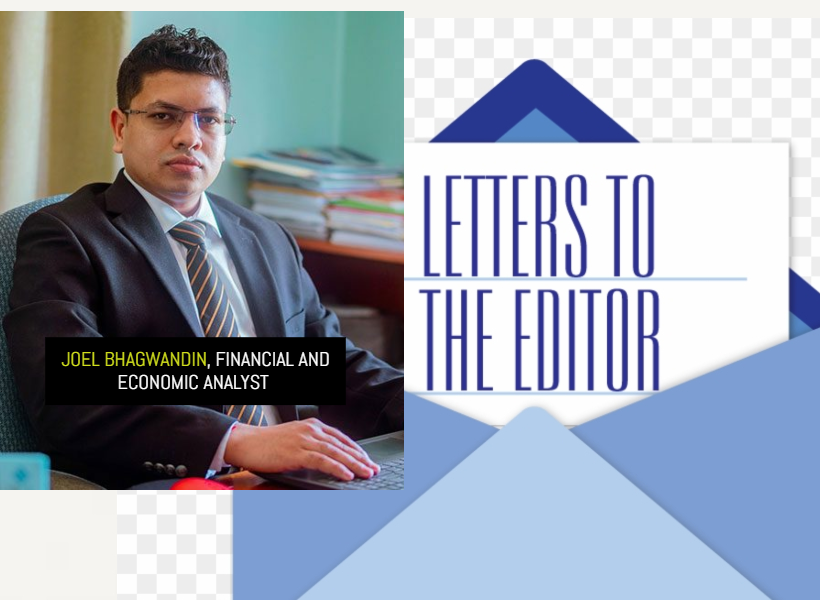Dear Editor,
In a four-part series of op-ed articles, Ret’d Rear Admiral Dr. Gary Best (hereinafter “the author”) attempted to critically analyze the national budget for the fiscal year 2024 (hereinafter “budget 2024”), but ineptly failed to provide any meaningful contribution. Instead, his publications were fraught with incoherent, unjustified opinionated ramblings, as demonstrated hereunder.
In part 1, the author contends that…the budget has no clear structure that points to medium or long-term certainty… no clear policy statements to indicate that the budgets are linked to indexed values…the budget is not set within any long term nationally ‘agreed to’ strategic and national development plan…there is no coherent overarching plan…the government is not engaged in any careful conception and analysis, any careful planning to what a budget really means…”.
Ironically, the author failed to substantiate his “aspersions” noted above in a coherent and robustly analytical manner, the very precepts that he accused the government of failing to perform.
The notion that there is no coherent overarching national development plan is factually incorrect. The PPP/C Government first developed a “National Development Plan” in 1994-1996, with the involvement of more than 200 Guyanese stakeholders, including civil society, private sector, and professionals from across various spheres. The incremental implementation of that strategy commenced almost immediately after it was finalized in 1996, through every national budget from 1997-2014 and from 2020 to present.
This is easily verifiable by examining all of the national budgets for those years in tandem with the National Development Strategy, 1996, that part of which can be obtained from the internet. For example, all of the road networks, highways, bridges including the new bridge across the Demerara River, a secondary city more inland (Silica City), the road network connecting Brazil/Guyana, and a feasibility study for the reintroduction of railways, just to name a few―are all contained in that strategy that was developed nearly three decades ago. This strategy was then followed by the “Poverty Reduction Strategy”, the “National Competitiveness Strategy”, the “Low Carbon Development Strategy” (LCDS) (2009 version), and the current updated and expanded version of the LCDS (2030).
With this in mind, the author who presented himself as a scholarly authority on these matters, would have had to firstly acknowledge that the aforementioned strategies exist, which he is fully-well aware of, but chose to ignore.
The author’s hastened exhibition of intentional ignorance cannot not repudiate the established fact that the aforesaid national strategies are in existence.
Secondly, assuming that the author is a credible scholar of some calibre, the author would have then had to skillfully establish that budget 2024, together with previous years PPP/C Government budgets, consistently deviated from their own national development framework.
Unfortunately, the author failed disastrously at so doing. If at all, there were any underlying merit and factual basis for the author’s aspersions; had he done so, he would have been able to easily, and systematically illustrate his case with irrefutable empiricism.
Thirdly, if the author is implying that the aforementioned national development strategies are not coherent overarching development plans and strategies, according to him, then the burden is upon him to intelligibly validate such notion, inter alia, an in-depth critical analysis of the referenced strategies and development plans. Unfortunately, the author failed in this regard as well.
Fourthly, the author is discernibly confused and/or completely oblivious about what constitute a budget. In fact, it might very well be that the author hasn’t even taken the time to read, much less to study the budget properly, with a view to comprehend and absorb its contents, structure, and the overarching framework.
To this end, the author contends that… the budget has no clear structure that points to medium or long-term certainty… no clear policy statements to indicate that the budgets are linked to indexed values”.
Here, the author displayed an elementary philosophical and theoretical error, misunderstanding, misinterpretation, misconception, and misapplication of a basic “terminology”. In this respect, there is no such thing as “medium or long-term certainty”, within a realistic and pragmatic context of how economies actually work. There is, however, medium to long term “predictability”, which is very different from certainty.
Fifthly, the national budgets do contain policy statements and targets. These can be found, not in the budget speech, but in Volume No.2 of the budget estimates. The policy statements include the objectives, strategies, impact, and indicators for the fiscal year. So, undoubtedly the author did not study the budget together with the accompanying estimates thoroughly, or perhaps, at all.
As evidently demonstrated herein, the author has failed miserably on several fronts to robustly justify his contentions within the framework of an empirical analysis. Therefore, the author’s essays cannot be taken seriously as any sort of critical analysis.
In a Part II to this article, the other aspects of the aforenamed author’s contentions in parts 3 & 4 of his series, will be addressed frontally.
Respectfully,
Joel Bhagwandin










